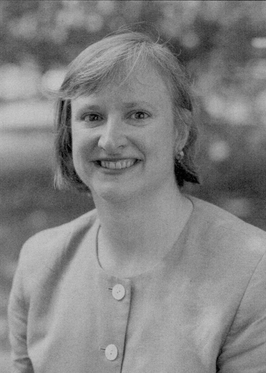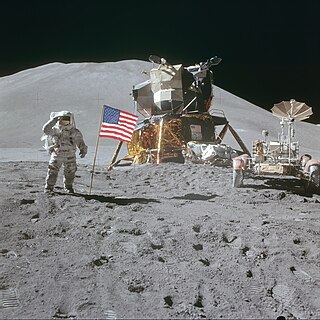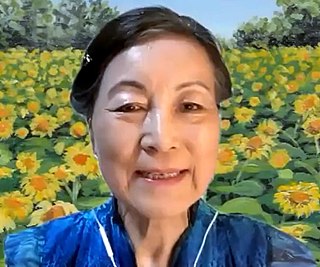
Enterprise resource planning (ERP) is the integrated management of main business processes, often in real time and mediated by software and technology. ERP is usually referred to as a category of business management software—typically a suite of integrated applications—that an organization can use to collect, store, manage and interpret data from many business activities. ERP systems can be local-based or cloud-based. Cloud-based applications have grown in recent years due to the increased efficiencies arising from information being readily available from any location with Internet access.
Cross-cultural communication is a field of study investigating how people from differing cultural backgrounds communicate, in similar and different ways among themselves, and how they endeavor to communicate across cultures. Intercultural communication is a related field of study.

An expatriate is a person who resides outside their country of citizenship.
In social philosophy, objectification is the act of treating a person as an object or a thing. It is part of dehumanization, the act of disavowing the humanity of others. Sexual objectification, the act of treating a person as a mere object of sexual desire, is a subset of objectification, as is self-objectification, the objectification of one's self. In Marxism, the objectification of social relationships is discussed as "reification".

Susan Catharine Eaton was an American political scientist and workers' rights activist. Eaton was an assistant professor of public policy at Harvard Kennedy School, who became a nursing home researcher at Harvard and workers' activist. She wrote about health care management, women's role in union leadership and work-family issues and gender equity in the workplace.
Workforce management (WFM) is an institutional process that maximizes performance levels and competency for an organization. The process includes all the activities needed to maintain a productive workforce, such as field service management, human resource management, performance and training management, data collection, recruiting, budgeting, forecasting, scheduling and analytics.

Employee engagement is a fundamental concept in the effort to understand and describe, both qualitatively and quantitatively, the nature of the relationship between an organization and its employees. An "engaged employee" is defined as one who is fully absorbed by and enthusiastic about their work and so takes positive action to further the organization's reputation and interests. An engaged employee has a positive attitude towards the organization and its values. In contrast, a disengaged employee may range from someone doing the bare minimum at work, up to an employee who is actively damaging the company's work output and reputation.
Work–family enrichment or work–family facilitation refers to a process at the work-life interface whereby experience or participation in one role increases the quality or performance in the other role.
Talent management (TM) is the anticipation of required human capital for an organization and the planning to meet those needs. The field has been growing in significance and gaining interest among practitioners as well as in the scholarly debate over the past 10 years, particularly after McKinsey's 1997 research and the 2001 book on The War for Talent. Although much of the previous research focused on private companies and organizations, TM is now also found in public organizations
The war for talent is a term coined by Steven Hankin of McKinsey & Company in 1997, and a book by Ed Michaels, Helen Handfield-Jones, and Beth Axelrod, Harvard Business Press, 2001 ISBN 978-1-57851-459-5. The war for talent refers to an increasingly competitive landscape for recruiting and retaining talented employees. In the book, Michaels, et al., describe not a set of superior Human Resources processes, but a mindset that emphasizes the importance of talent to the success of organizations.
Global workforce refers to the international labor pool of workers, including those employed by multinational companies and connected through a global system of networking and production, foreign workers, transient migrant workers, remote workers, those in export-oriented employment, contingent workforce or other precarious work. As of 2012, the global labor pool consisted of approximately 3 billion workers, around 200 million unemployed.
Cross-cultural psychology attempts to understand how individuals of different cultures interact with each other. Along these lines, cross-cultural leadership has developed as a way to understand leaders who work in the newly globalized market. Today's international organizations require leaders who can adjust to different environments quickly and work with partners and employees of other cultures. It cannot be assumed that a manager who is successful in one country will be successful in another.
Mark E. Mendenhall is a university professor who holds the J. Burton Frierson Chair of Excellence in Business Leadership in the Gary W. Rollins College of Business at the University of Tennessee, Chattanooga. Mendenhall is an internationally recognized scholar in the field of global leadership and international human resource management and a pioneer in the field of expatriate adjustment. With his co-authors he published seminal theoretical contributions in expatriate adjustment and training in the 1980s and 1990s. From the early 2000s, he has focused his research primarily in the emerging field of global leadership.
An international assignment is an overseas task set by a company to an employee. Companies that engage in international assignments are mainly multinational corporations (MNCs). MNCs send employees from the home country to a different country for business operations at overseas offices or subsidiaries. These employees are called expatriates. International assignments can fulfil a number of key organisational functions and are viewed as development opportunity for organisations to build a global and mature workforce. As a result of globalisation and the saturation of domestic markets, international assignments are a strategic tool for organisations to compete successfully on the global stage and achieve specific organisational objectives. These organisation missions are a key way of developing global perspectives. They can encourage diverse inputs into decision and develop shared values within the Headquarters, home country and subsidiaries. International assignments are a component of the training and development activities of international human resource management. Other main activities include human resource management in the global environment, selection, performance management, compensation and repatriation.
Employee recognition is the timely, informal or formal acknowledgement of a person's behavior, effort, or business result that supports the organization's goals and values, and exceeds their superior's normal expectations. Recognition has been held to be a constructive response and a judgment made about a person's contribution, reflecting not just work performance but also personal dedication and engagement on a regular or ad hoc basis, and expressed formally or informally, individually or collectively, privately or publicly, and monetarily or non-monetarily.
Social capital is the product of human interactions and relationships, which occur between individuals and social networks. Therefore, it can be summarized as the shared links, understandings and values that allow individuals and groups to trust each other, and therefore, to work with each other in society.
Cultural agility is a term employed in talent management to design a complex competency based on skills whose command allows an individual or an organization to perform successfully in cross-cultural situations. Cultural agility has been conceptualized as an individual's ability to comfortably and effectively work in different cultures and with people from different cultures, national origins, generations, gender, etc. People with cultural agility are able to "build trust, gain credibility, communicate, and collaborate effectively across cultures". The concept appears to overlap with others such as cross-cultural competence and cultural intelligence. The subject has been linked to studying abroad, foreign talent acquisition, immigrants and refugees, career success, sports coaching, leadership development, and global business. Currently, the term is often associated with research carried out by Paula Caligiuri, and a few others like Marisa Cleveland, and Zeinab Shawky Younis. On psychological aspects, the command of cultural agility resources may be facilitated by personality traits like extraversion, openness, and predisposition to novelty seeking, but also by appropriate learning. Self-assessment has been pointed out as a practical approach to evaluate the level of competence reached by cultural agility trainees.
Green human resource management emerged as an academic concept from the debate of sustainable development and corporate sustainability. Wehrmeyer (1996) is often stated as laying the foundation with his idea that "if a company is to adopt an environmentally-aware approach to its activities, the employees are the key to its success or failure".
Mark A. Huselid is a university professor, workforce management specialist, book author, and business consultant. He is the Distinguished Professor of Workforce Analytics at D'Amore-McKim School of Business, Northeastern University. He has authored research papers and books regarded as seminal to establishing a strategic link between human resource management and business performance.

Anne S. Tsui is a professor of International management, who holds the positions of Motorola Professor Emerita of International Management at Arizona State University, distinguished adjunct professor at the University of Notre Dame, and distinguished visiting professor at Peking University and Fudan University, China.





